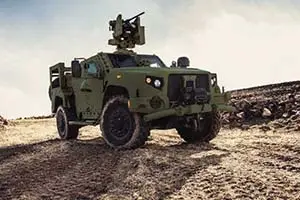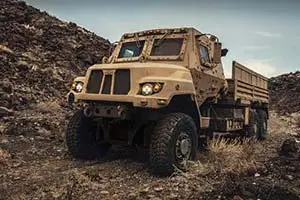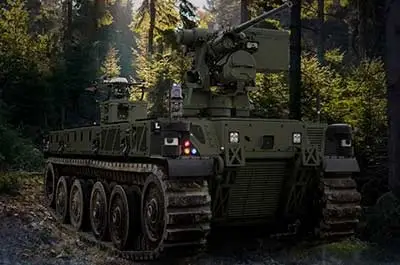OSHKOSH, WIS. OSHKOSH, WIS. (August 31, 2001) — Oshkosh Truck Corporation [NASDAQ: OTRKB], a leading manufacturer of specialty trucks and truck bodies, was selected recently as an industry partner for hybrid-electric technology applications for military vehicles. The selection was made by the National Automotive Center and includes directions to integrate the Oshkosh ProPulse™ hybrid-electric system into an Oshkosh HEMTT military truck model as part of a subcontract from Southwest Research Institute (SwRI), an independent research and development organization. SwRI is the prime contractor to the U.S. Army Tank-Automotive and Armaments Command (TACOM) on this project, and Oshkosh is a major subcontractor to SwRI. The program manager for heavy tactical vehicles at TACOM provided the vehicle to be equipped with the ProPulse system.
“The selection by the National Automotive Center for us to refine this groundbreaking technology for the U.S. military is a major vote of confidence in the work Oshkosh has already done. Our unique, alternative drive technology has the potential to revolutionize heavy truck performance – to bring it to a level never seen before. Hybrid-electric technology in smaller vehicles is not new, but Oshkosh has taken a leadership role in making it affordable and practical for tough, severe-duty applications such as military or fire trucks,” said Robert G. Bohn, Oshkosh’s chairman, president and chief executive officer.
Electric Drive System Simplifies Drive Train to Deliver More Power
The ProPulse system design uses a unique, modular series-hybrid arrangement to simplify the transmission of power to the wheels. The diesel engine powers a large electric generator, which provides direct power to the wheels, eliminating the torque converter, transmission, transfer case, and drive shafts. A dedicated motor drives each differential independently. Each motor is controlled from its own power converter.
Oshkosh believes this technology can increase the fuel economy, or payload-to-fuel ratio as it is known in military circles, by up to 40 percent over conventional power train designs. The diesel engine is optimized for operation at a constant revolutions-per-minute (rpm). This eliminates the inefficiency associated with changing rpm levels during acceleration and deceleration. The constant speed slashes emissions as well.
Increased readiness is another advantage of the system. The control system generates real-time diagnostic data for preventive maintenance adjustments and provides a history of that information. This allows operators to schedule maintenance in advance, which maintains peak performance.
With the ProPulse system, vehicles can do double duty as on-site power sources. This reduces the military’s need for cumbersome generators to power communications and radar
systems. For fire departments it means the elimination of costly auxiliary generators for scene lights and extrication equipment. The system can produce up to 500 kilowatts of electricity, enough to power 250 to 300 typical homes.
The Oshkosh “Transformation” HEMTT equipped with ProPulse hybrid-electric technology will be unveiled in October at the Association of the United States Army conference in Washington, DC.
The U.S. Army’s National Automotive Center was established in 1992 at the U.S. Army TACOM in Warren, Mich., as a cooperative Army-industry research and development facility. The Center’s primary aim is to leverage TACOM’s proximity to Detroit’s leading engineering centers of excellence for joint ventures or joint research into dual-use automotive technologies. Such research benefits both military and commercial automotive applications. Results are far greater performance, durability, safety and economy.
Oshkosh Truck Corporation [NASDAQ: OTRKB] is a leading manufacturer of specialty trucks and truck bodies for the fire and emergency, defense, concrete placement and refuse hauling markets. Products are marketed under the Oshkosh, Pierce, McNeilus, Geesink, Norba and Medtec brand names. The company is headquartered in Oshkosh, Wis., and had annual sales of $1.3 billion in fiscal 2000.











